|
|
|
Sort Order |
|
|
|
Items / Page
|
|
|
|
|
|
|
| Srl | Item |
| 1 |
ID:
124427
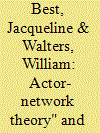

|
|
|
|
|
| Publication |
2013.
|
| Summary/Abstract |
Like any multiplicity, "actor-network theory" is many things: an influential current within the sociology of science and technology; a relational and anti-essentialist form of materialism; an insistence that notions of agency not be confined to human subjects but embrace objects, devices, and other non-human entities; and much else besides.
|
|
|
|
|
|
|
|
|
|
|
|
|
|
|
|
| 2 |
ID:
123582
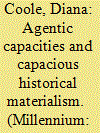

|
|
|
|
|
| Publication |
2013.
|
| Summary/Abstract |
In this article, I note that the idea of a new materialist turn has recently been gathering steam. The first part considers some of the signature elements of the new materialisms. The most distinctive aspect identified here is the invocation of a generative or vital ontology of immanence. Following discussion of some of its principal claims, the article draws out its implications for reconceptualising agency, in particular regarding the way agentic capacities are recognised to be distributed across animate, and perhaps also inanimate, entities. The significance of this development for the political sciences is then explored. In a second part, I suggest that the new materialism entails a normative project. Here, ethical overtures towards a new sensitivity predicated on vital materialist insights are contrasted with a renewed critical theory. The latter is commended as a material reckoning of the 21st century: a project provisionally labelled a capacious historical materialism.
|
|
|
|
|
|
|
|
|
|
|
|
|
|
|
|
| 3 |
ID:
187539
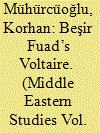

|
|
|
|
|
| Summary/Abstract |
Beşir Fuad (1852?-1887) is an obscure figure among late nineteenth century Ottoman intellectuals known for his materialistic views which were unprecedented under the Hamidian regime (1876-1909) and who shocked his contemporaries by committing suicide at an early age, leaving a note and a letter containing his last impressions and world view. Just months before his suicide, Beşir Fuad published a Voltaire biography in which he commemorates him as an Enlightenment ideal to be emulated in humankind’s struggle against religious intolerance. In this article, Beşir Fuad’s Voltaire (1886) is examined, arguing that the monograph was, though in an embryonic form, an early expression and defence of individual liberty, based on a materialistic world view that aims at demystification of the prevailing customs and morals as irrational and superstitious absurdities to pave the way for a future society in which the individual would be in liberty.
|
|
|
|
|
|
|
|
|
|
|
|
|
|
|
|
| 4 |
ID:
105921
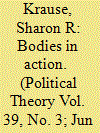

|
|
|
|
|
| Publication |
2011.
|
| Summary/Abstract |
A better appreciation of the material, distributed quality of human agency can illuminate subtle dynamics of domination and oppression and reveal resources for potentially liberatory political action. Materialist accounts of agency nevertheless pose challenges to the notion of personal responsibility that is so crucial to political obligation and democratic citizenship. To guard against this danger, we need to sustain the close connection between agency and a sense of selfhood that is individuated, reflexive, and responsive to norms. Yet we should acknowledge that reflexive selfhood is not the whole of individual agency for the sources of agency extend beyond the individual herself. We also need to recognize the ways that both reflexivity and norm-responsiveness are themselves embodied capacities. When properly conceived, a materialist view of agency can increase awareness of our often-unwitting contributions to systematic inequalities of power and extend our political responsibilities in emancipatory directions, thus holding great promise for democratic
|
|
|
|
|
|
|
|
|
|
|
|
|
|
|
|
| 5 |
ID:
108187
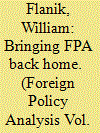

|
|
|
|
|
| Publication |
2011.
|
| Summary/Abstract |
This article borrows the concept of "metaphorical framing" from cognitive linguistics and uses it to engage cognitive foreign policy analysis (CFPA) with social constructivism. By accounting for the mutual constitution of agents and social structures (on one hand), and the interaction of somatic and social meaning (on the other), metaphorical framing narrows the gap between cognitive and constructivist approaches and enriches them both. Though it claims a "middle ground" between idealism and materialism, constructivism ignores how the shared meanings that constitute actors are embodied, that is, produced by the evolved human body-brain and its situatedness in the world. Metaphorical framing "fleshes out" constructivism, allowing it to theorize the causal micro-foundations of constitutive effects. On the other hand, CFPA brackets the social dimension of meaning. Metaphorical framing accounts for the shared meanings that constitute actors. It explains how these meanings are instantiated in the mind, and how they shape reasoning. Accounting for intersubjectivity in decisionmaking, then, helps CFPA avoid reductionism. While narrowing the gap between two research traditions, metaphorical framing also advances theories of discourse, persuasion, rhetoric, emotion, and decisionmaking. Ultimately, metaphorical framing facilitates theoretically integrative, methodologically pluralist research on the nature and role of meaning in foreign policy.
|
|
|
|
|
|
|
|
|
|
|
|
|
|
|
|
| 6 |
ID:
080889
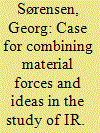

|
|
|
|
|
| Publication |
2008.
|
| Summary/Abstract |
Neorealism tends to base itself on a certain, taken-for-granted, view of the material forces in IR, a view which focuses on the relative distribution of capabilities between sovereign states and their consequences in terms of the socialization and competition among states. Social constructivism is preoccupied with the study of ideas, but tends not to question the neorealist view of either socialization or competition or of the material world; the result is that the development and change of how material forces impact with the social world in IR is seriously under-theorized. The present contribution argues in favour of an approach which includes materialist as well as ideational factors; in that sense it advocates `analytical eclecticism'. A rich concept of international structure, which includes materialist as well as ideational factors, is proposed and the consequences of that concept for the analysis of IR are indicated
|
|
|
|
|
|
|
|
|
|
|
|
|
|
|
|
| 7 |
ID:
130688
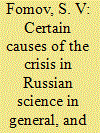

|
|
|
|
|
| Publication |
2014.
|
| Summary/Abstract |
The article focuses on the crisis in Russian Science, particularly Military Science. Topics presented include the crisis in military science as discussed by N.M. Vasilyev on his paper "On the Crisis in Military Science and Ways of Dealing with It," published by Military Thought journal, differences between military art and science, dialectics and materialism as scientific methodology.
|
|
|
|
|
|
|
|
|
|
|
|
|
|
|
|
| 8 |
ID:
124407
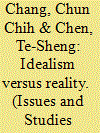

|
|
|
|
|
| Publication |
2013.
|
| Summary/Abstract |
Using data from the fifth wave 0/ the World Values Survey, this study analyzes the origins of postmaterialism and how it might affect people s support for environmental protection on the two sides of the Taiwan Strait. Our empirical results show that the level of postmaterialism in China is no less than it is in Taiwan. Age and education are two essential predictors for postmaterialism at the level of individual analysis. Middle class intellectuals in China are more concerned about postmaterialist issues than their counterparts in Taiwan. In addition, we .find that the Chinese demonstrate higher levels of support for environmental protection than the Taiwanese do, whereas Chinese postmaterialists are less likely to be concerned about the environment than Taiwanese postmaterialists. Therefore, we suggest a revised version of Inglehart's hypotheses to explain support for environmental protection. The paper underlines the effect of political institutions on shaping cultural values, in contrast previous studies that give too much weight to economic development
|
|
|
|
|
|
|
|
|
|
|
|
|
|
|
|
| 9 |
ID:
137480
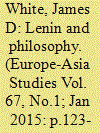

|
|
|
|
|
| Summary/Abstract |
The article follows the development of Lenin's philosophical conceptions and the historical context in which they emerged. It examines how Plekhanov's interpretation of Marxist philosophy was assimilated by Lenin. In the dispute between Plekhanov and Alexander Bogdanov Lenin took Plekhanov's side and in defence of Plekhanov wrote Materialism and Empiriocriticism. A major influence on Lenin was the correspondence between Marx and Engels published in 1913, which prompted him to study Hegel and other writers mentioned in the correspondence. Although Lenin's commentaries on Hegel and other philosophers were published as ‘Philosophical Notebooks’, the notes Lenin made on the Marx–Engels correspondence were not, owing to Stalin's peculiar requirements of the Lenin cult.
|
|
|
|
|
|
|
|
|
|
|
|
|
|
|
|
| 10 |
ID:
157607
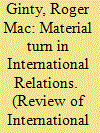

|
|
|
|
|
| Summary/Abstract |
This article explores how analysis of material objects offers insights into international intervention and reactions to that intervention. Building on studies that examine the 4x4 as emblematic of intervention, the article argues that the 4x4 can also be seen as an object of resistance and agency. To do so, it uses the case study of 4x4 usage in Darfur and draws on primary data including interviews and a UN security incident database. The article is mindful of the limitations of a ‘material turn’ in the study of International Relations, especially in relation to how it might encourage us to overlook agency and structural power. While finding new materialism arguments largely convincing, the case study encourages a note of caution and proposes the notion of ‘materialism+’, which allows for the further investigation of the human/non-human interface, but is circumspect about tendencies towards neophilia, dematerialism, and posthumanism.
|
|
|
|
|
|
|
|
|
|
|
|
|
|
|
|
| 11 |
ID:
109977


|
|
|
|
|
| Publication |
2011.
|
| Summary/Abstract |
The People of Puerto Rico occupies an ambivalent place in both the genealogy of anthropological theory and the understanding of Puerto Rican society. Its co-authors collectively developed a uniform and complex conceptual scheme which expressed both convergence and divergence among them. The book furthered Marxist approaches in U.S. anthropology and was the first serious scholarly materialist analysis of Puerto Rico. While privileging the lives of common people, it fell short of representing important strains of Puerto Rican diversity and socio-historical dynamics. The Puerto Rico Social Anthropology Project used four different models to explain the genesis of cultural forms and the interrelations among aspects of society/culture, in a given, homogeneous, "subculture" or "socio-cultural segment" of a complex society. The Project's members stressed a linear-utilitarian analysis of these subcultures, but where they could not account for observed cultural forms with such an approach, they appealed to the culture-psychology relation. This article considers the four interlinked paradigms, the associated analysis of socio-cultural trends, the resulting problematic theoretical consequences, and the flawed Marxism of the work.
|
|
|
|
|
|
|
|
|
|
|
|
|
|
|
|
| 12 |
ID:
105646
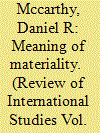

|
|
|
|
|
| Publication |
2011.
|
| Summary/Abstract |
Gramsican approaches in International Relations (IR) have sought to outline the relationship between ideas and material forces in the construction of world order. Scholars working within this broad school have sought to emphasise that ideas are material forces, and must be considered as concrete historical structures (Cox, 1987) central to the establishment of particular historical and hegemonic blocs. This literature has primarily focused on the discursive construction of hegemony by international elites and the impact this has on political practices. While these insights are important in understanding the construction of world order, it is necessary to extend them to include the creation of actual physical structures - that is, it is vital to link the ideational aspects of hegemony with actual material processes. I will argue that a consideration of the role of technology provides an ideal vehicle for this process, building on the preliminary work of Bieler and Morton in this regard (2008). Technological structures are the product of particular cultural values and embed these cultural values within their very structure. Physical material factors thereby express ideational values constructed by specific social forces. Social practices are thus not only a function of the dominance of certain ideological formations, but also the product of the material environment itself and the manner in which the human metabolism with nature must function through these physical constructions.
|
|
|
|
|
|
|
|
|
|
|
|
|
|
|
|
| 13 |
ID:
038749


|
|
|
|
|
| Publication |
London, Collins, 1974.
|
| Description |
xv, 254p.hbk
|
| Standard Number |
0002118424
|
|
|
|
|
|
|
|
|
|
|
|
Copies: C:1/I:0,R:0,Q:0
Circulation
| Accession# | Call# | Current Location | Status | Policy | Location |
| 014592 | 951.5/NOR 014592 | Main | On Shelf | General | |
|
|
|
|
| 14 |
ID:
152006


|
|
|
|
|
| Summary/Abstract |
This article analyses the paradoxically central role of a railroad in Soviet economic growth in southern Tajikistan’s Vakhsh River valley during the 1930s. Constructed as a secondary service road of the Vakhshstroi agro-industrial complex, it was not meant to support enterprises throughout the region. Because of the republic’s lack of roads, however, unrelated freightage operations gravitated to the Vakhsh Railroad and made it the unintended mediator of the developing geography of Soviet movement. By examining how the narrow gauge line was used in unplanned ways, I find that state building under Stalin was characterized by improvisation in labour and mobility. Furthermore, the material conditions of transportation limited the locations of economic possibility in unanticipated ways. This case demonstrates that studying the use of infrastructure can further historical understanding of causes, effects and chronologies of economic life in the Stalin era.
|
|
|
|
|
|
|
|
|
|
|
|
|
|
|
|
| 15 |
ID:
123586


|
|
|
|
|
| Publication |
2013.
|
| Summary/Abstract |
The turn to military robotics is a striking feature of contemporary Western warfare. How then to make sense of the increasing reliance on unmanned weapons systems, in particular, the use of combat-enabled Unmanned Aerial Vehicles/drones? Questioning the intuitive and oft-repeated claim that robotics 'take the human experience out of war' (reducing it to a video game), I argue that in order to make sense of current developments, we need precisely to reconsider our understanding of the human, her role in, and experience of, war. In this, we are aided by a critical materialist inquiry that investigates the human-material assemblage as a complex whole, taking both fleshy and steely bodies into account. Drawing on the philosophies of Maurice Merleau-Ponty and Judith Butler, I show that only by considering what being human means - in ontological terms - and by asking how human experience is altered through new technologies will we be able to think politically and ethically about contemporary war.
|
|
|
|
|
|
|
|
|
|
|
|
|
|
|
|
| 16 |
ID:
193311
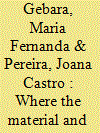

|
|
|
|
|
| Summary/Abstract |
Forests, and ways of relating to forests, are critical to the planet, yet largely neglected in IR. In this article, we engage with the debate on the Anthropocene and explore different forms of relationality to forests and Amazonian indigenous symbolism. Drawing mainly on political sociology, political ecology, and anthropology, we approach the Amazon basin as a site where nature, culture, resource extraction, and spirituality are enmeshed, and discuss material and symbolic meanings of the forest. The article starts by briefly reviewing discourses around the Anthropocene. It then looks at Amazonian countries with a specific focus on the classist foundations of socioecological exploitation that underpin anthropocentric attitudes and practices, and analyses the material way of perceiving the Amazon. It proceeds by addressing the diverse symbolism present in indigenous traditional knowledge; symbolism that may help in moving politics and society beyond the dominant attitudes that initiated the Anthropocene. Finally, the article offers possibilities for perceiving the forest differently and intertwining the Amazon's material and symbolic worlds.
|
|
|
|
|
|
|
|
|
|
|
|
|
|
|
|
|
|
|
|
|